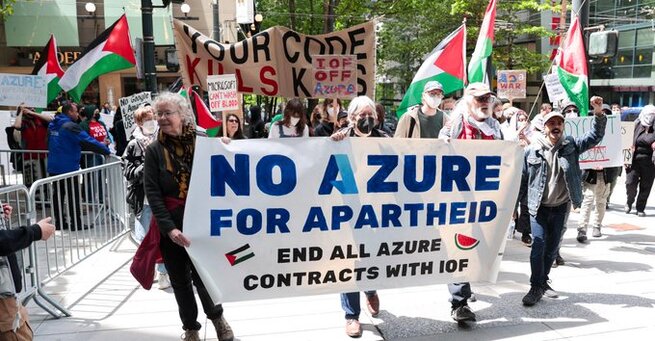
Palestinian Protester Disrupts Microsoft Build Keynote Over Israel Ties
Is Microsoft supporting Israel through its Azure cloud and AI technologies? That’s the burning question that took center stage during day two of Microsoft Build 2025, when a Palestinian developer interrupted a keynote to protest the company’s commercial relationship with the Israeli government. Shouting, “My people are suffering!” and “No Azure for apartheid!”, the protester demanded that Microsoft sever ties with Israel’s Ministry of Defense. This marks the second consecutive day of such protests, igniting conversation about the tech giant’s ethical responsibilities and the use of AI in international conflicts.
The protest unfolded while Jay Parikh, Microsoft’s head of CoreAI, was discussing Azure AI Foundry—an initiative aimed at empowering developers with cutting-edge AI tools and cloud services. As Parikh spoke, the Palestinian tech worker stormed the stage, condemning Microsoft’s cloud and artificial intelligence collaborations with Israel. Security swiftly removed the individual, but not before he called on the company to take a stand on human rights. The protest was organized with help from “No Azure for Apartheid,” a group advocating for ethical tech policies within major corporations.
Tensions were already high after a similar disruption the day before, when Microsoft employee Joe Lopez interrupted CEO Satya Nadella’s opening keynote. Lopez, along with a former Google employee, voiced similar concerns about the company’s cloud services being allegedly complicit in the ongoing Gaza conflict. Lopez later circulated an internal email to thousands of Microsoft employees urging them to speak out. “If we continue to remain silent, we will pay for that silence with our humanity,” he wrote—an appeal that quickly went viral across internal forums.
While Jay Parikh momentarily stumbled following the disruption, he resumed the presentation with the support of a colleague. Parikh, who joined Microsoft from Meta last year, has been leading efforts to evolve the company’s AI ecosystem, which includes expanding its Azure cloud platform for developers. Microsoft Build, widely recognized for major AI announcements and cloud innovation, is now making headlines not just for tech breakthroughs but for the growing ethical debates that surround them.
These protests come just days after Microsoft revealed the findings of an internal audit and third-party review into how its technology is used in global conflict zones. According to Microsoft, the relationship with Israel’s Ministry of Defense is described as a “standard commercial agreement,” and the company claims there is no evidence that its AI or cloud services have been misused. It also stated that its AI Code of Conduct is actively enforced. However, critics argue that such corporate assurances fall short, especially when lives are at stake in real-world applications of digital infrastructure.
Adding to the controversy, two former Microsoft employees also disrupted the company's 50th-anniversary celebration last month. One protester directly called out Mustafa Suleyman, Microsoft’s AI chief, labeling him a “war profiteer” and accusing the company of enabling war crimes through its technological partnerships. These protests are amplifying calls for increased corporate accountability and transparency—particularly when it comes to AI deployment in geopolitical conflicts.
Why Microsoft’s AI Partnerships Are Under Scrutiny
Microsoft’s cloud and AI offerings, especially Azure, are deeply integrated into defense, security, and government systems worldwide. High CPC keywords such as AI cloud solutions, enterprise AI services, and ethical AI in defense are now at the forefront of both digital advertising and ethical discourse. As governments turn to Big Tech for defense technologies, the line between innovation and complicity becomes increasingly blurred. Public scrutiny and internal dissent, as evidenced at Microsoft Build 2025, suggest that employee activism in Big Tech is not slowing down anytime soon.
Developers and IT professionals attending Build are now faced with more than just coding challenges—they’re being confronted with ethical dilemmas about how their work is used. With Microsoft being a leader in AI development, its decisions set a precedent for the rest of the tech industry.
A Wake-Up Call for Corporate Ethics in AI
The repeated disruptions at Microsoft Build have sparked a broader conversation about ethical cloud computing, AI governance, and corporate accountability. These protests are not isolated outbursts—they're reflections of a growing movement within tech circles to align innovation with human rights. From Google to Amazon, and now Microsoft, tech employees are demanding that companies prioritize responsible AI use and compliance with international humanitarian law.
Microsoft’s continued investments in AI infrastructure and cloud services ensure that it remains a dominant force in the tech world. However, these recent events serve as a critical reminder: innovation without oversight can come at a devastating cost. For a company that positions itself as a global leader in ethical AI, the burden of transparency and responsibility grows with every product release, keynote, and contract.
Whether you’re a developer working in AI, a business considering enterprise cloud solutions, or a user concerned about how technology shapes our world, Microsoft Build 2025 has become more than just a showcase for innovation. It’s now a stage where ethics and technology collide in real-time. As Microsoft pushes forward with Azure and CoreAI development, it must also reckon with the demands for accountability from both inside and outside its organization.
𝗦𝗲𝗺𝗮𝘀𝗼𝗰𝗶𝗮𝗹 𝗶𝘀 𝘄𝗵𝗲𝗿𝗲 𝗿𝗲𝗮𝗹 𝗽𝗲𝗼𝗽𝗹𝗲 𝗰𝗼𝗻𝗻𝗲𝗰𝘁, 𝗴𝗿𝗼𝘄, 𝗮𝗻𝗱 𝗯𝗲𝗹𝗼𝗻𝗴. We’re more than just a social platform — from jobs and blogs to events and daily chats, we bring people and ideas together in one simple, meaningful space.